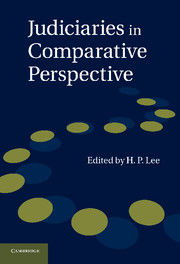Book contents
- Frontmatter
- Contents
- Contributors
- Foreword
- Preface
- Table of cases
- Table of statutes
- Part I
- Part II
- Part III
- Part IV
- 14 Judges, bias and recusal in Australia
- 15 Judges, bias and recusal in Canada
- 16 Judicial recusal in New Zealand
- 17 Judges, bias and recusal in South Africa
- 18 Judges, bias and recusal in the United Kingdom
- 19 Bias, the appearance of bias, and judicial disqualification in the United States
- Part V
- Part VI
- Index
- References
16 - Judicial recusal in New Zealand
from Part IV
Published online by Cambridge University Press: 07 September 2011
- Frontmatter
- Contents
- Contributors
- Foreword
- Preface
- Table of cases
- Table of statutes
- Part I
- Part II
- Part III
- Part IV
- 14 Judges, bias and recusal in Australia
- 15 Judges, bias and recusal in Canada
- 16 Judicial recusal in New Zealand
- 17 Judges, bias and recusal in South Africa
- 18 Judges, bias and recusal in the United Kingdom
- 19 Bias, the appearance of bias, and judicial disqualification in the United States
- Part V
- Part VI
- Index
- References
Summary
At the end of the nineteenth century the New Zealand Court of Appeal was bristling with righteous indignation at the mere conception that a superior court judge could be disqualified for bias; for by the very fact of sitting the judge had already honourably concluded (from a Panglossian perspective) that no impediment of bias existed. The early cases looked single-mindedly towards a current and direct financial interest as being the exclusive basis for judicial disqualification. Only that narrowly drawn category of bias could interfere with the sworn duty of a judge: ‘nothing short of direct pecuniary interest will so disqualify a judge of a court of record of superior or general jurisdiction such as is this Court’. Over time the austerity of the original test was relaxed so that a direct pecuniary interest did not exist where it was ‘so remote as to be fanciful’, or where the interest depended on a number of contingencies. But where a court fine for breach of a by-law would be paid under legislation to a borough council, a councillor of that body who held office as a Justice of the Peace was disabled from issuing a summons upon the information of the council. A decision of a Compensation Court was invalidated because one of the parties before the court was represented by a partner in the same law firm as a lay member of the court, the lawyer’s fee being paid into the joint partnership account. Indirect pecuniary interests engage an expansive protean notion. They may arise from a relationship (rather than from a contractual or financial connection) and extend to cases of potential advantage, benefit or liability. Where a magistrate had been lawfully engaged in financial business transactions with a person up until the day before that person sought from the magistrate a liquor licence, remarkably it somehow survived scrutiny. The myopic focus applied, namely, that there was no current conflict of interest involved, was quite unreal. It asked the wrong question. A clinical, temporal distraction wrongly succeeded. It was implausible in the extreme that one night’s sleep altered the appearance of anything, although it was literally no longer a current pecuniary association.
- Type
- Chapter
- Information
- Judiciaries in Comparative Perspective , pp. 322 - 345Publisher: Cambridge University PressPrint publication year: 2011



